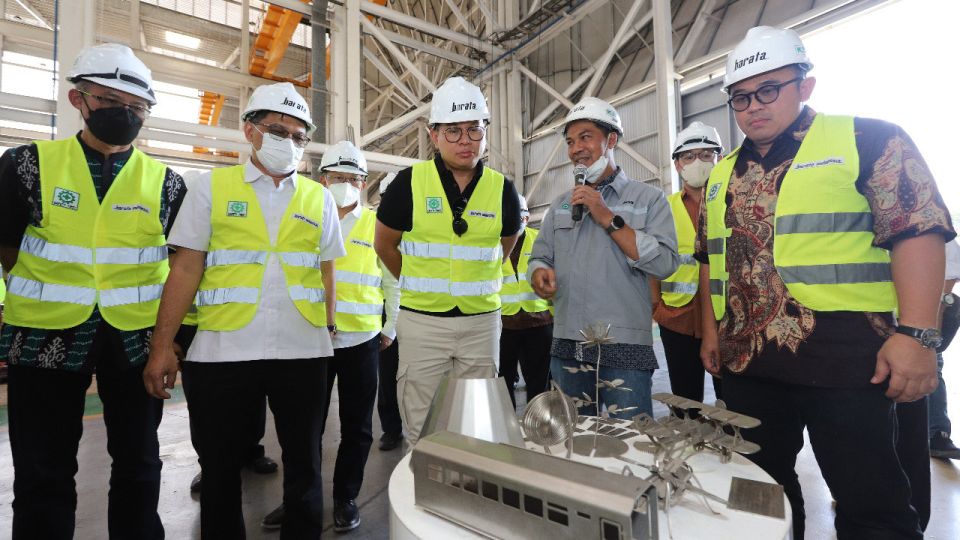December 5, 2022
JAKARTA – Electric vehicle (EV) producers are confident that the planned subsidy for purchasing electric cars and electric motorcycles will drive EV sales in Indonesia.
Tenggono Chuandra Phoa, secretary-general of the Indonesian Electric Vehicle Industry Association (Periklindo), told The Jakarta Post on Thursday that the subsidy would significantly increase the EV adoption rate.
According to Tenggono, assuming that an electric motorcycle cost Rp 22 million (US$1,425), the planned purchase subsidy of Rp 6.5 million per vehicle would reduce the cost of an electric motorcycle to less than the price of a comparable fuel-powered motorcycle, which generally cost around Rp 18 million.
“The challenge now is to formulate the most [effective] technical guidance to ensure that the subsidy is on target and that [its] disbursement is entirely transparent to the public,” he added.
Coordinating Maritime Affairs and Investment Minister Luhut Pandjaitan said the government was finalizing the purchase subsidy scheme of around Rp 6.5 million per electric motorcycle to drive sales across the country. He added that a similar purchase subsidy scheme for cars was being considered, but did not provide any details.
“If you want to swap your [fuel-powered] motorcycle for an electric one next year, do it. You will get a subsidy,” Luhut told a banking forum hosted by online media Katadata and broadcast live on Nov. 29.
Amid the high prices of gasoline and diesel fuel, the government has been pushing for the faster adoption of EVs nationwide, aiming to get at least 1.2 million electric motorcycles and 35,000 electric cars on roads by 2024.
Earlier this year, it announced a goal to increase the number of electric car owners to 500,000 within four years. To that end, it issued a presidential instruction in September for all state institutions and their regional offices to shift to EVs and for state-owned electricity company PLN to ramp up the number of charging stations across the country.
However, Southeast Asia’s largest economy has a long way to go to achieve its EV ambitions.
Taufiek Bawazier, the Industry Ministry’s director general of the metals, machinery, transportation equipment and electronics industries (ILMATE), said on Nov. 9 that only 3,317 four-wheeled EVs, 21,668 two-wheeled EVs and 274 three-wheeled EVs were on the country’s roads as of Sept. 8.
Industry groups have said EV demand is growing, but sales volumes are still low compared to fuel-powered cars among the 270-million-strong population, attributing the difference to the higher prices of EVs.
Gilarsi W. Setijono, president director of PT VKTR Teknologi Mobilitas, the EV manufacturing arm of conglomerate Bakrie & Brothers, said the main impediment to EV adoption was the price gap between EVs and fuel-powered vehicles.
Batteries still remain a prohibitively expensive component, and while their prices have decreased significantly in the last few years, further innovation is needed to make EVs more affordable and attractive to consumers. Current research and development efforts are focusing on tweaking the batteries’ chemical composition to increase EV range and reduce production costs.
“I expect the EV [purchase] subsidy to significantly increase the EV adoption rate in Indonesia. The industry greatly appreciates the move,” he told the Post during an interview on Friday.
Gilarsi also suggested that the government could consider implementing the EV purchase subsidy alongside a waiver on EV import duties to boost domestic demand.
Asked about any impediments to implementing the policies simultaneously, he said that stakeholders’ will “to make it happen is crucial”.
Abrar Aulia, an industry and regional analyst at state-owned lender Bank Mandiri, said the Rp 6.5 million purchase subsidy would significantly boost sales of electric motorcycles. He noted, however, that the subsidy amount should not be the same for all electric motorcycles, as different models varied in price between Rp 10 million and Rp 40 million.
“Apart from the product side, it would be necessary to consider who is entitled to receive the subsidy, as it is related to state spending,” he said on Friday.
Jakarta is keen to develop the domestic EV and electric vehicle battery (EVB) industries after it banned the exports of nickel ore in 2020 to ensure the raw material’s sufficient supply to attract investors to the processing industry.
The country has reduced sales tax for EVs and hybrid cars since 2019.
“Stakeholders should consider the number of [electric motorcycles] that can be produced domestically,” automotive expert Bebin Djuana, who is also an executive with a major car producer, told the Post on Thursday, as the current capacity of local EV producers “may not be in line with the government’s targets”.
“Meanwhile, the subsidy amount should be adjusted according to the state budget,” he added.


